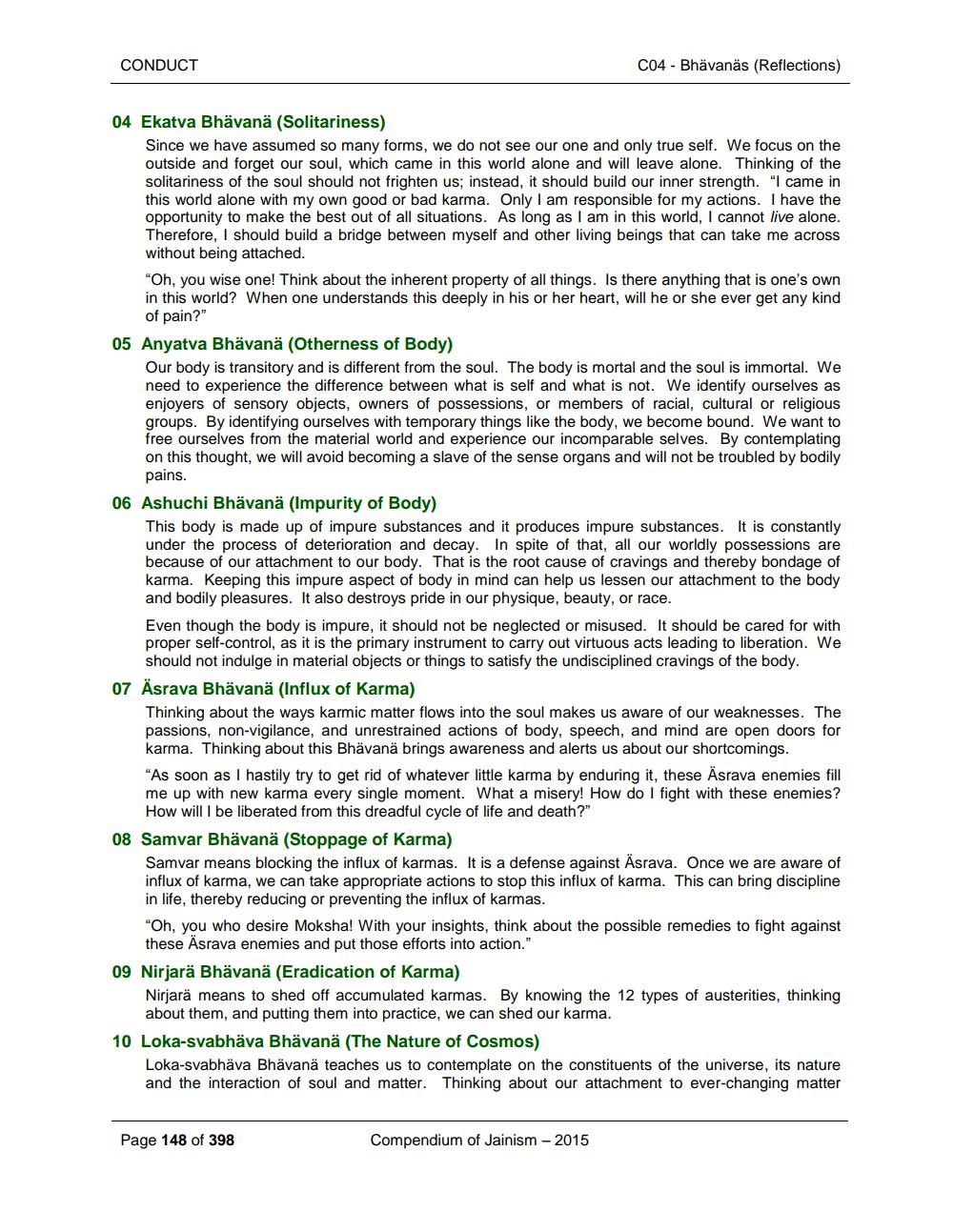________________
CONDUCT
C04 Bhävanäs (Reflections)
04 Ekatva Bhävanä (Solitariness)
Since we have assumed so many forms, we do not see our one and only true self. We focus on the outside and forget our soul, which came in this world alone and will leave alone. Thinking of the solitariness of the soul should not frighten us; instead, it should build our inner strength. "I came in this world alone with my own good or bad karma. Only I am responsible for my actions. I have the opportunity to make the best out of all situations. As long as I am in this world, I cannot live alone. Therefore, I should build a bridge between myself and other living beings that can take me across without being attached.
"Oh, you wise one! Think about the inherent property of all things. Is there anything that is one's own in this world? When one understands this deeply in his or her heart, will he or she ever get any kind of pain?"
05 Anyatva Bhāvanā (Otherness of Body)
Our body is transitory and is different from the soul. The body is mortal and the soul is immortal. We need to experience the difference between what is self and what is not. We identify ourselves as enjoyers of sensory objects, owners of possessions, or members of racial, cultural or religious groups. By identifying ourselves with temporary things like the body, we become bound. We want to free ourselves from the material world and experience our incomparable selves. By contemplating on this thought, we will avoid becoming a slave of the sense organs and will not be troubled by bodily pains.
06 Ashuchi Bhävanä (Impurity of Body)
This body is made up of impure substances and it produces impure substances. It is constantly under the process of deterioration and decay. In spite of that, all our worldly possessions are because of our attachment to our body. That is the root cause of cravings and thereby bondage of karma. Keeping this impure aspect of body in mind can help us lessen our attachment to the body and bodily pleasures. It also destroys pride in our physique, beauty, or race.
Even though the body is impure, it should not be neglected or misused. It should be cared for with proper self-control, as it is the primary instrument to carry out virtuous acts leading to liberation. We should not indulge in material objects or things to satisfy the undisciplined cravings of the body.
07 Asrava Bhavana (Influx of Karma)
Thinking about the ways karmic matter flows into the soul makes us aware of our weaknesses. The passions, non-vigilance, and unrestrained actions of body, speech, and mind are open doors for karma. Thinking about this Bhävanä brings awareness and alerts us about our shortcomings.
"As soon as I hastily try to get rid of whatever little karma by enduring it, these Äsrava enemies fill me up with new karma every single moment. What a misery! How do I fight with these enemies? How will I be liberated from this dreadful cycle of life and death?"
08 Samvar Bhävanä (Stoppage of Karma)
Samvar means blocking the influx of karmas. It is a defense against Äsrava. Once we are aware of influx of karma, we can take appropriate actions to stop this influx of karma. This can bring discipline in life, thereby reducing or preventing the influx of karmas.
"Oh, you who desire Moksha! With your insights, think about the possible remedies to fight against these Äsrava enemies and put those efforts into action."
09 Nirjarä Bhävanä (Eradication of Karma)
Nirjarä means to shed off accumulated karmas. By knowing the 12 types of austerities, thinking about them, and putting them into practice, we can shed our karma.
10 Loka-svabhäva Bhävanä (The Nature of Cosmos)
Loka-svabhäva Bhävanä teaches us to contemplate on the constituents of the universe, its nature and the interaction of soul and matter. Thinking about our attachment to ever-changing matter
Compendium of Jainism - 2015
Page 148 of 398




